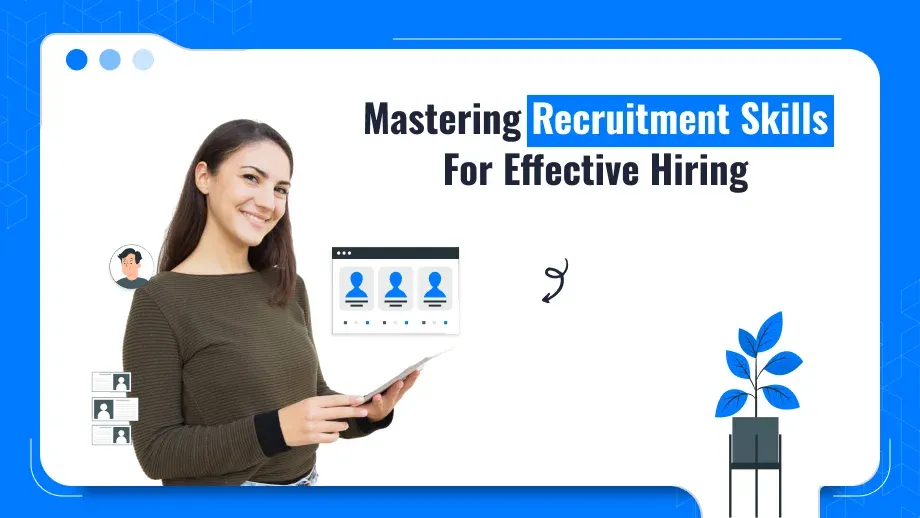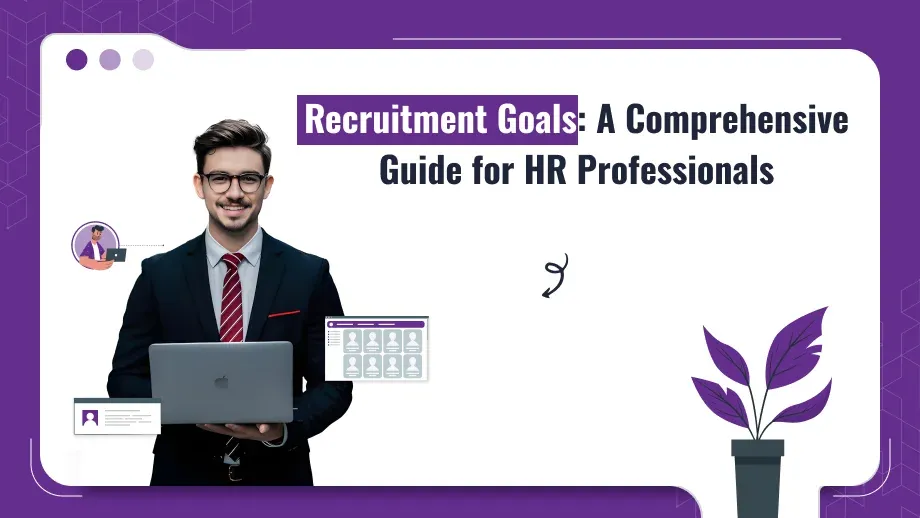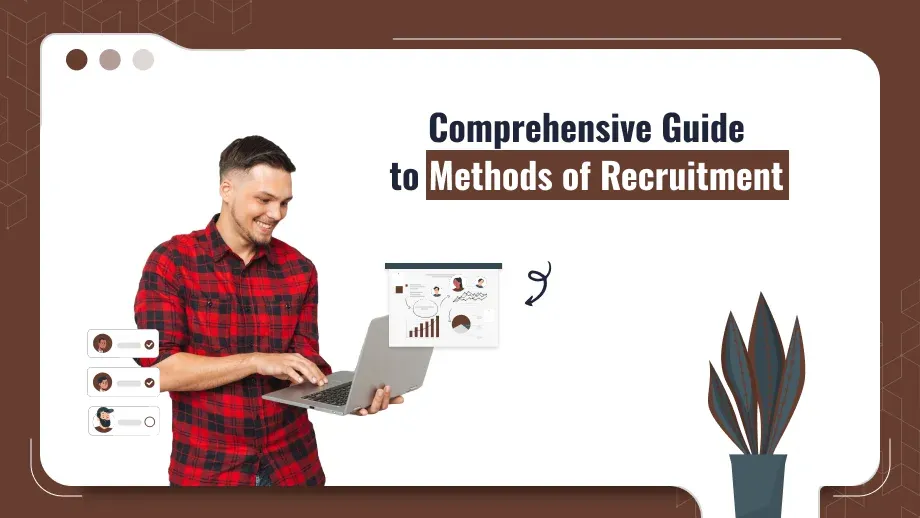
Recruitment can be seen as a method of filling in positions. However, the right talents are fundamental in putting together organizational success. Recruitment skills can prove to be quite essential in this competitive market to identify, assess, and attract the best candidates.
From the requirements of a job to leveraging technology, these roles play an important part in streamlining the hiring process. This article will discuss essential recruiter skills, how one develops them, and their roles in modern hiring strategies.
What Are Recruitment Skills?
Recruitment skills are skills that involve the effective management of the hiring process. Such skills combine communication, analytical thinking, relationship building, and technical knowledge for the best fit for the roles. Recruitment skills succeeded for skills recruitment only when hiring practices were aligned with organizational goals and maintained an exceptional candidate experience.
Key Recruitment Skills Every Recruiter Needs
The best recruiter links the right talent to the right opportunities. That calls for a combination of strong skills such as technical abilities, emotional IQ, and strategic thinking. Below are the essential skills of an HR recruiter every recruiter should master:
Communication Skills
Effective communication is the backbone of recruitment. The recruiters must clearly communicate job expectations to the applicants and smooth out communications involving hiring managers and the applicants.
- Crafting compelling job descriptions.
- Managing expectations through transparent communication.
- Active listening to understand candidate needs and concerns.
Relationship Management
Building long-term relationships with candidates and hiring managers is essential in creating a positive and collaborative recruitment process.
- Engaging candidates with personalized interactions.
- Maintaining a talent pool for future roles.
- Fostering trust and rapport during the hiring journey.
Attention to Detail
A good recruiter should carefully analyze the resume, conduct background checks, and adhere to the company and legal standards set.
- Spotting inconsistencies in resumes or applications.
- Ensuring job descriptions align with organizational needs.
- Monitoring hiring documentation for accuracy.
Adaptability and Agility
Constant priorities, unexpected challenges, and changing hiring requirements mean that often recruiters have to be adaptable to move forward and thrive.
- Adapting to changing job market trends.
- Managing hiring fluctuations and urgent vacancies.
- Learning new tools and technologies quickly.
Technical Proficiency
In the wake of digitalization, recruiters need to be competent in leveraging recruitment technology in the interest of efficiency and quality candidate experience.
- Operates Applicant Tracking Systems to ensure effective storing and tracking of applicants.
- Manages the recruitment software to source and screen.
- Knows how to use recruit marketing platforms for sourcing of right talent.
Negotiation Skills
Recruiters are usually a go-between between the candidates and hiring managers to work out job offer terms, salary expectations, and benefits.
- Salary discussion and offer negotiations.
- Finding a balance that satisfies both the candidate and the employer.
- Handling counteroffers diplomatically.
Analytical Thinking
Strong analytical skills help recruiters assess the candidates, measure recruitment effectiveness, and fine-tune strategies.
- Assessing recruitment metrics like time-to-hire and cost-per-hire.
- Analyzing trends in sourcing to fine-tune sourcing strategies.
- Using analytical power to predict hiring needs and potential challenges.
Problem-Solving Skills
Challenges are expected from recruits while hiring; for example, candidates may withdraw at the last minute or may have different expectations of what was advertised.
- Addressing last-minute candidate dropouts.
- Mediating conflicts between candidates and hiring teams.
- Developing creative solutions for hard-to-fill roles.
Cultural Awareness
Knowing and respecting differences in a given workplace is very essential for diversity-friendly recruitment.
- Being aware of the difference between what cultures expect from applicants.
- Encourage diversity and inclusion in hiring processes.
- Job descriptions should not contain biased wording.
Time Management
In an organization, recruiters are multi-tasking officers; hence time management is very important in meeting the set deadlines.
- Prioritizing urgent roles and tasks.
- Balancing candidate follow-ups and interview scheduling.
- Streamline working processes to increase productivity.
Make smarter hiring decisions by building expertise.
Make sure your recruitment skills are up to date!
Behavioral and Competency-Based Interviewing
Recruitment requires good interviewing skills because it also evaluates technical as well as soft skills.
- Using structured interview questions to evaluate competencies.
- Identifying behavioral patterns that indicate potential for success.
- Tailoring questions to align with specific role requirements.
Emotional Intelligence
Recruiters often handle sensitive discussions and high-stakes decisions. Strong EQ helps them navigate these interactions with empathy and professionalism.
- Understanding and responding to candidate emotions.
- Managing rejection conversations gracefully.
- Building trust and confidence with both candidates and hiring managers.
Sales and Marketing Skills
Recruitment often involves “selling” the role and organization to candidates. Marketing skills ensure recruiter skills can highlight the employer’s unique value proposition.
- Promoting the company culture and benefits effectively.
- Using storytelling to engage potential candidates.
- Leveraging social media and recruiting marketing tools to attract talent.
Advanced Recruitment Skills for Modern Hiring
- Leveraging technology: Tools such as ATS automatically screen resumes and track applicants.
- Recruitment marketing: targeted campaigns and branding effectively work to promote job openings and attract the finest talent
- Data-driven decision making: metrics such as time-to-hire and offer acceptance rates guide recruiters to perfect their strategies
- Diversity awareness: inclusive hiring ensures that organizations reap the benefits of diverse perspectives and skills
Specialized Skills for HR Recruiters
Human resource recruiters require some specific skills to align their recruitment processes with other HR functions.
- Cultural Fit Assessment: The ability of an hr recruiter skills to get candidates that reflect the values of an organization.
- Employee Engagement Knowledge: The ability of retention strategies helps the recruiters to hire candidates that would last longer in the company.
How To Improve Your Recruiting Skills
Recruitment is a field constantly in a state of change, and professionals have to keep bolstering their skills because the demands of modern hiring are ever-changing. Several ways can be given how to boost your recruitment skills and keep on top in the competitive world of talent acquisition:
Stay Updated on Recruitment Trends
- Read the best blogs, articles, and reports on recruitment trends weekly.
- Attend webinars and conferences to stay ahead of others in recruitment techniques and technology.
- Follow thought leaders in the recruitment space on LinkedIn to be inspired and learn.
- Read the best blogs, articles, and reports on recruitment trends weekly.
Leverage Recruitment Technology
- Understand how an Applicant Tracking System (ATS) can make applicant management easy.
- Through AI-powered sourcing tools, one can identify top talent quickly and accurately.
- Discover the most outstanding best HRMS Payroll Software in India and other integrated platforms for managing recruitment workflows.
Enhance Your Communication Skills
- Write job postings, emails, and interview invitations using clear and concise speech
- Listen actively. Justify candidate needs versus expectations from hiring managers
- Tailor your messaging: while holding an attractive message for candidates in competitive markets.
Invest in Training and Certifications
- Training Engage-specific courses on sourcing, interviewing, or diversity recruiting.
- Certifications Pursue Professional Recruiter Certification (PRC) or Talent Acquisition Specialist Certification to add weight to your skills.
- Workshops – Skills training on behavioral interviewing and negotiation
Build a Strong Personal Brand
- Establish yourself as a knowledgeable recruiter by sharing valuable content on platforms like LinkedIn.
- Engage with potential candidates and industry professionals through social media.
- Highlight successful placements and testimonials to showcase your expertise and attract top talent.
Learn Advanced Candidate Assessment Techniques
- Through structured interviews, assess technical and soft skills in an organized manner.
- Explore psychometric and behavioral assessment tools to go deeper into candidate suitability.
- Use situational judgment tests for roles requiring skills in problem-solving and making decisions.
Develop Data-Driven Recruitment Strategies
- Recruit measurable metrics in terms of time-to-hire, cost-per-hire, and dropout rates during the process.
- Use data to detect bottlenecks in your hiring and streamline your approach.
- Keep track of sourcing channels to know which yields the best results for certain roles.
Focus on Employer Branding
- Work with the marketing teams and develop relevant content that showcases the company culture.
- Employ recruit marketing to carry out employer branding across social media, job boards, and career websites.
- Share stories of success, testimonies from workers, and celebratory achievements in the workplace to attract the best candidates.
Network with Industry Professionals
- Relationship building with other recruiters, hiring managers, and professionals in the industry.
- Attending industry networking events, meetups, and job fairs to get more connections.
- Online groups and forums related to recruitment can be joined to share ideas and best practices.
Enhance Time Management Skills
- Scheduling tools to organize interviews, follow-ups, and candidate communications
- Keep the urgency of closing up roles but have a steady focus on long-term recruitment goals.
- Divide these tasks into manageable steps to not be overwhelmed but to deliver them as scheduled.
Strengthen Negotiation and Closing Skills
- Negotiate job offers to strike a balance between what a candidate wants and what the company is willing to spend.
- Assertively dispel candidate apprehensions by highlighting the value and opportunity of the role.
- Craft a personalized approach to closing candidates, particularly on high-stakes roles.
Recruitment Skills for Candidate Assessment
- Behavioral Interviewing: Structured questions to understand past behaviors measure how well a candidate fits in with the culture and problem-solving skills.
- Technical Assessment: For specialized roles, evaluating technical expertise through tests or portfolio reviews is essential.
- Soft Skill Assessment: Communication, teamwork, and adaptability must be evaluated to ensure that candidates can successfully handle themselves in group settings.
The Role of Recruitment Skills in Building Employer Branding
Recruiters are also responsible for shaping the company’s image. Strong recruitment skills ensure that candidates have a positive experience from initial contact right up to onboarding. Consistent communication, transparency, and professionalism enhance the employer brand, as it would be easier to attract talented employees.
Challenges in Developing Recruitment Skills
- Skill Gaps: Recruiters may lack proficiency in areas like technology adoption or data analysis.
- High Workload: Balancing multiple tasks can hinder skill development.
- Limited Training Resources: Many organizations fail to invest adequately in upskilling their recruitment teams.
- Keeping Up with Trends: Rapid changes in recruitment trends require continuous learning.
Future Trends Impacting Recruitment Skills
- Virtual Recruiting: Skills to master virtual interviews and remote hiring skills will become one of the must-have competencies, as will remote working.
- AI and Automation: In sourcing and screening, the use of AI can make a recruiter truly competitive.
- Global Talent Acquisition: Issues in managing international hires will become increasingly key.
- Internal Recruitment Process: These Processes that strategically make the internal talent pool move across levels and functions to fill roles appropriately will be crucial.
Conclusion
Recruitment skills mean and involve more than just the amalgamation of skills but form the basis of any successful hiring strategy. The current talent market in recruiting rests squarely on the shoulders of recruiters, as these professionals take on their frontline roles in targeting and securing the best talent for organizational growth.
Basic recruitment skills include communication, adaptability, and technical know-how among others handling challenges head-on and establishing well-knit teams in the long run for business success.
Being proactive and adaptable, recruiters should be able to be more responsive and flexible enough to change in accordance with shifting recruitment trends like the use of Applicant Tracking Systems as well as embracing diversity recruiting. They have to keep looking out for opportunities to learn, upskill, and keep track of market dynamics.







